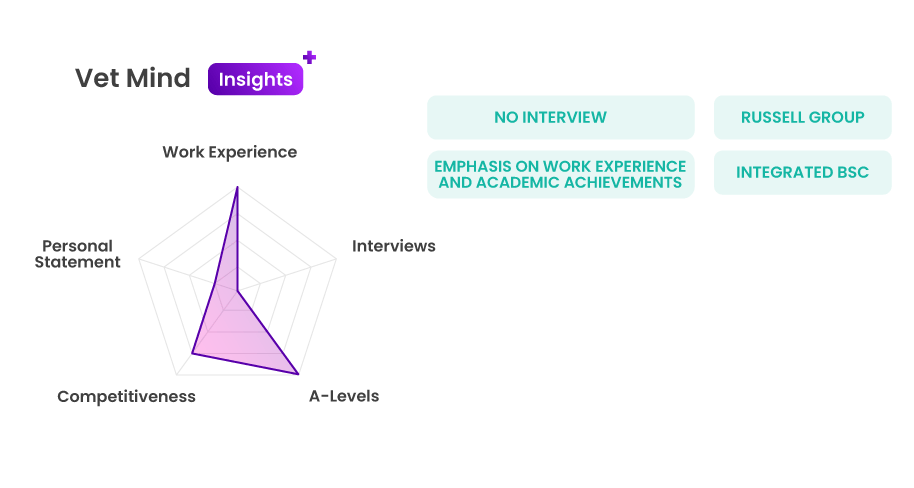Bristol Veterinary School

Overview
Bristol’s modern curriculum will introduce you to the structure and function of healthy animals, the mechanisms of disease and furthermore, their clinical management. The importance of professional skills, animal health and welfare and veterinary public health are all themes which are highlighted throughout your time at Bristol and are the themes which underpin all veterinary disciplines. At Bristol vet school you will spend the first three years at the main university campus in Clifton, with at least one day a week spent at the clinical veterinary campus. The fourth and fifth years are taught purely at this separate clinical veterinary campus, with an extended, lecture-free, final clinical year.
Table of Contents
ToggleKey points
- No interview (Supplementary Assessment Questionnaire)
- Integrated BSc
- Dual campus teaching

FAQs
Bristol Veterinary School is a world-renowned institution that provides undergraduate and postgraduate education and training in veterinary medicine, veterinary nursing, and related fields. It is part of the University of Bristol and is located in Langford, North Somerset, UK.
The admissions process for Bristol Veterinary School varies depending on the programme. For the Bachelor of Veterinary Science programme, applicants must meet academic requirements, submit a personal statement, and complete a supplementary assessment questionnaire (SAQ). For postgraduate programmes, applicants must meet academic requirements and submit a personal statement and references.
Once candidates have submitted your UCAS application, they will be sent an email. Applicants must read the email carefully before filling in the supplementary assessment questionnaire (SAQ). The admissions tutors will be looking for:
– An awareness of required attributes to succeed on the course
– An understanding of the job roles of the veterinary surgeon and the challenges they may
face.
– An understanding of the factors that affect how people work together in groups.
Bristol Veterinary School offers undergraduate degrees in Veterinary Science and Veterinary Nursing, as well as postgraduate degrees in a range of areas including Veterinary Sciences, One Health, and Global Wildlife Health and Conservation.
Bristol Veterinary School has state-of-the-art facilities, including a large animal hospital, small animal hospital, diagnostic laboratories, and research facilities. The school also has a dedicated team of faculty and staff who provide support and guidance to students throughout their studies.
Bristol Veterinary School offers a wide range of opportunities for students, including clinical placements, research projects, and extracurricular activities. Students also have access to a range of student societies and clubs, as well as opportunities to participate in outreach and community engagement programmes.
Yes, Bristol Veterinary School offers a range of scholarships and bursaries to support students in their studies. There are also government-funded loans and grants available to eligible students. It is important to check the financial aid options available for each programme before applying.
Getting into Bristol Veterinary School is highly competitive, and the application process can be challenging. The school receives a large number of applications each year, and the selection process is rigorous. However, the school does not release the acceptance rate or minimum admission requirements, so it is difficult to determine how difficult it is to get into Bristol Veterinary School. To increase your chances of being accepted, it is important to have a strong academic record, relevant work experience, and a well-written personal statement that highlights your passion for veterinary medicine.
About the university
| Key Information | |
| Website | http://www.bristol.ac.uk/study/undergraduate/2020/vet-science/bvsc-veterinary-science/ |
| [email protected] | |
| Phone number | +44(0)117 4282744 |
| Course Information | |
| Teaching style | Traditional Teaching style changes across the 5 years. In the first year, you will be mostly learning via lectures, seminars etc and independent studies. From year 1 to year 4 the amount of time in lectures and seminars decreases whilst the amount of independent studying and placement work increases. The final 2 years are spent entirely on the Langford clinical veterinary campus where you will undergo more practical work along with your rotations in the final year - this final year is practical and clinical for the most part with minimal lectures. |
| Course length | 5 years |
| Courses offered | 3 courses offered BVSc Veterinary Science. BVSc Veterinary Science: Accelerated Graduate Entry. (4 years) BVSc Gateway to Veterinary Science. (6 years) |
| Graduate entry | Yes |
| Foundation or access | Yes The University of Bristol's Veterinary School is involved in a widening participation scheme which allows for contextual offers which currently is a two grade lower offer. They also offer a foundation course as well as a gateway course. Contact the university for more information or to see if you are eligible. |
| University Life | |
| Local area | Bristol In the pre-clinical years you’ll be living in the universities fantastic accommodation blocks located around the centre of Bristol each with its own entertainment floor. After these opening years you will be moving into local housing around the picturesque Langford Campus in the countryside where you will find all things veterinary such as a fantastic teaching animal hospital and a working farm. |
| Social life | The City of Bristol is well known for its trendy/hipster scene with a plethora of artisan cafes and vegan restaurants along with vibrant bars and clubs which will make for some unique night-life experiences. It’s also a great place for sight-seeing with its hilly roads and the works of Banksy dotted around the place. Moreover, the incredibly historic and picturesque City of Bath is only a short train journey if you’re looking for a unique excursion on your days off and finally, like the other veterinary schools, Bristol university has many societies so there will probably be one for everyone. |
| Interview | |
| Interview style | No interviews |
| Interview dates | N/A |
| Admissions Tests | |
| UCAT | N/A |
| GAMSAT | N/A |
| Academic Requirements | |
| GCSE | Subjects required: N/A Grades required: Standard numeracy requirement (4 or C in GCSE Mathematics or equivalent) and Standard literacy requirement (4 or C in GCSE English or equivalent). |
| A-level | Subjects required: Chemistry and one of Biology, Physics or Mathematics as well as a third subject of your choosing. Grades required: AAA or A*AB– standard offer. AAC or A*BC – contextual offer. |
| Scottish Advanced/Highers | Subjects required: Chemistry and one of Biology, Maths and Physics. Grades required: AAAA |
| IB | Subjects required: HL Chemistry and one of Biology, Physics or Maths. Grades required: 36 points 18 at HL, including 6,6 at HL in Chemistry and one of HL Biology, HL Physics or HL Mathematics. |
| Bachelor's Degree (Gradutes Only) | Grades required: 2:1 in a related or core science subject. |
| Statistics | |
| Number of applicants per interview | |
| Number of applicants per place |








